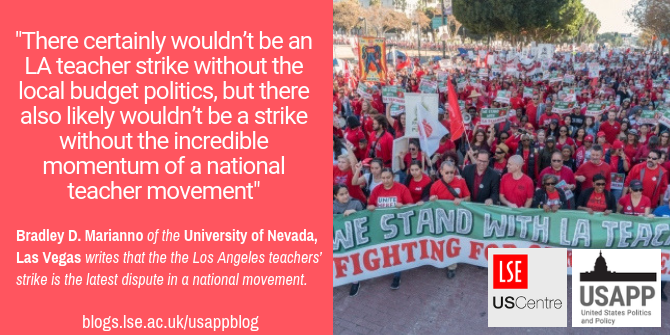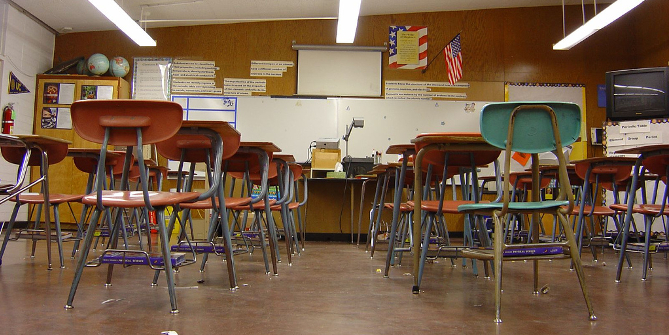 As of today, tens of thousands of teachers in one of America’s largest cities have walked off the job in the latest dispute between a teachers’ union and a school district. Bradley D. Marianno writes that the Los Angeles teachers’ strike is both a continuation of the national ‘Red4Ed’ movement – which has seen teachers’ strikes across the US over the past year – and a labor dispute that is particular to local budget politics in California. This latest strike action, he comments, also shows that old labor tactics may still be effective at a time when union organizing is under legal attack.
As of today, tens of thousands of teachers in one of America’s largest cities have walked off the job in the latest dispute between a teachers’ union and a school district. Bradley D. Marianno writes that the Los Angeles teachers’ strike is both a continuation of the national ‘Red4Ed’ movement – which has seen teachers’ strikes across the US over the past year – and a labor dispute that is particular to local budget politics in California. This latest strike action, he comments, also shows that old labor tactics may still be effective at a time when union organizing is under legal attack.
After nearly two years of negotiations with district officials, operations in the nation’s second largest school district—one that stretches 710 square miles, employs over 30,000 teachers and support staff, and instructs a student body as large as the population of Las Vegas (640,000)—have come to a screeching halt.
Work stoppages like this one are largely a relic of organized labor’s past, at least until last year, when teacher protests in West Virginia, Oklahoma, North Carolina, Kentucky, Colorado, Arizona, Washington, and Illinois transported teacher organizing back in time. This proverbial labor time machine deemed the “Red4Ed” movement yielded favorable concessions for teachers in most locations, including increased education funding and teacher and support staff raises, some over 20 percent.
Against the backdrop of this national teacher movement, some have asked whether the Los Angeles Unified School District (LAUSD) teacher strike is a continuation of Red4Ed or something completely different. Is it more of an aberration of local politics and circumstances or a piece in the larger mosaic of a renewed fervor for teacher organizing? The short answer to this question is “yes.”
A Local Contract (Or Really Budget) Dispute
As is the case in most public-sector labor disputes, there would be no LAUSD teacher strike without the now currently toxic mixture of local budgets and politics. At the heart of the debate in LAUSD are questions of what the school district can afford to pay—and the answer to this question is wholly dependent on who you ask. The United Teachers of Los Angeles (UTLA), the association representing teachers in negotiations, have consistently pointed to LAUSD’s budget reserve of 1.8 billion dollars as evidence of the district’s ability to bankroll an immediate 6.5 percent salary increase, class size reductions, and other bargaining demands; however, the district has been quick to note that this reserve fund has been steadily declining over time as the district consistently spends more than it takes in.
The budget drama in Los Angeles, is in fact, being played out up and down the state of California. Notwithstanding state funding increases to education over the last five years, school districts (some prominent examples include Sacramento City Unified – who narrowly averted a strike in 2017- Fremont Unified, Oakland Unified, and Paso Robles Joint Unified) are seeing rising costs that are now increasingly being paid out of reserves. A prime contributor to these rising costs has been Assembly Bill 1469 (2014), legislation that increased school districts’ payments to the state teacher retirement system from 8 percent of payroll costs in 2013 to 19 percent by 2020. Some districts began stockpiling reserve funds in preparation for the increased retirement contributions. Coming off a historic recession with lean reserves and no salary increases, it’s not terribly surprising, then, that labor groups look at these reserve funds as evidence of a rosier fiscal climate and ask “what gives?”

“DSC09112 copy” by Milwaukee Teachers’ Education Association (MTEA) is licensed under CC BY NC 2.0
In my research interviews with teachers’ union contract negotiators in California and Michigan last year, it became clear that disagreements over teachers’ pay is, in part, a function of the difference between the district and union budget projections. Both the union and the school district (mostly separately) make an effort to determine how much money is available to be spent, and sometimes use different assumptions (about student enrollment, staff allocations, benefit contributions, etc.) to arrive at their estimate. The wider the gulf between union and school district budget projections, the more contentious the negotiations. Case in point, UTLA says the district is “starving our schools by hoarding the reserves” and LAUSD says the union’s offer would “literally make LA Unified insolvent.”
A National Movement
Budget issues aside, it’s still hard to imagine this bargaining stalemate dragging on for nearly two years without any movement on practically all of the issues brought to the table, including items that have little fiscal impact. The district faced a precarious budget situation in 2015 when the two parties last negotiated and they brokered a deal with both sides making concessions. Why is there an impasse now?
Four years ago was a different time. Teachers’ unions suffered a huge Supreme Court defeat last summer in which the justices strictly prohibited the common practice of collecting fees from non-union members for union bargaining services, leading some teachers to drop their membership (it’s still too early to tell how many). As I’ve written elsewhere, the Janus case could usher in a new era of teachers’ union activism. Unions now have to provide enough value for teachers to justify paying the full cost of membership versus free-riding on union bargaining services they no longer have to pay for. Successful collective action, like a strike, is one way to do that.
Furthermore, when teachers brushed off the dust on the old labor tactic last year, they showcased that it still has viability. They revealed that when teachers collectively raise their voices, the public gets behind them in even some of the unfriendliest labor states. A recent PDK poll found that a whopping 78 percent of public school parents support teachers right to walk out of the classroom. The striking teachers further demonstrated that a united front is achievable, even as the union organizing it is under legal attack and even as the old union guard retires and is replaced by a younger generation of educators. Imagine the grassroots organizing needed to generate and sustain a successful nine-day strike across 55 West Virginia counties, where teachers have no collective bargaining rights and no legal right to strike. They did it.
By my estimation, there certainly wouldn’t be an LA teacher strike without the local budget politics, but there also likely wouldn’t be a strike without the incredible momentum of a national teacher movement. This year could see renewed teacher labor activity, a hearkening back to days of old. A successful strike for LA teachers would pass the baton to the next group of educators who only need the smallest of nudges to turn their dissatisfaction into a picket line.
Please read our comments policy before commenting.
Note: This article gives the views of the author, and not the position of USAPP– American Politics and Policy, nor of the London School of Economics.
Shortened URL for this post: https://bit.ly/2TMFCCM
About the author
 Bradley D. Marianno – University of Nevada, Las Vegas
Bradley D. Marianno – University of Nevada, Las Vegas
Bradley D. Marianno is an assistant professor of educational policy and leadership at the University of Nevada, Las Vegas. His research focuses on the consequences of local and state education policy change for educational governance and outcomes with a substantive focus on teacher labor policy, teachers’ unions, and the politics of policymaking and implementation. More information on his work on unions and collective bargaining can be found at https://www.teachercontracts.org.







I was a teacher in the Los Angeles Unified School District (LAUSD) for nearly 40 years until I retired three years ago.
As you point out, there is a difference in budget projections between the teachers union (UTLA) and LAUSD, but there is also a difference in priorities. The main sticking point in negotiations is not salary, but class size. For years the District has claimed that they had no money to reduce class size (which can run as high as a student teacher ratio of 45 to 1). Despite this, the District miraculously finds money for endless standardized assessment tests or other expenditures that teachers find unwarranted.
Teachers, with great support from parents and students, have had it with the lack of funds excuse as well as the misguided policies and are willing to take drastic action to push LAUSD to reevaluate their priorities and focus on reforms that actually help students learn. This is also a means to put pressure on the state, who is the ultimate provider of education funding, to allocate more money to schools.
Another issue in the Los Angeles teacher strike is the Superintendent and the School Board’s strong support for charter schools. Charter schools receive government funding but are privately run independent entities that are not subject to many of the rules that apply to regular public schools. The problem is that charter schools drain funds from public schools, often syphon off the top students, and do not have the rigorous oversight public schools have. Despite these apparent advantages, there is no evidence that charter schools are significantly better than public schools.
The charter school industry has spent millions of dollars in California to help elect school board members and politicians who support them. This is what has happened in Los Angeles and this is why the teachers union has fought hard to limit the expansion of these schools. At the same time, the monied supporters of charter schools want to see a return on their investment. The result is the current impasse and strike.